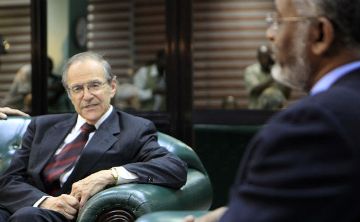Sudan to include foreign groups in assessing South Kordofan’s humanitarian situation
February 19, 2012 (KHARTOUM) – The Sudanese government has decided to involve international organizations in an operation to assess humanitarian needs in the country’s war-torn region of South Kordofan, an official announced on Sunday, drawing approval from a visiting US official.

However, she stresses that international organizations must conduct themselves in accordance with the directives of the federal government and local authorities in the state.
Al-Fadil’s revelation marks another dilution in the stance of the Sudanese government. Khartoum initially opposed any role of international aid organizations in Blue Nile and South Kordofan but later said that UN agencies will be given limited access and without direct involvement in the distribution of aid.
South Kordofan and Blue Nile are the scene of a military conflict between the Sudanese government and rebels who fought as part of the former guerrilla-turned-official army of the neighboring state of South Sudan before its independence.
Khartoum accuses South Sudan of supporting its former comrades-in-arms, a charge Juba denies.
The Sudanese minister made the announcement during a meeting with the US special envoy to Sudan, Princeton Lyman. According to Sudan’s official news agency SUNA, Al-Fadil demanded that the US Administration exerts influence on the government of South Sudan to resort to peaceful means.
Washington has been spearheading a campaign to persuade Khartoum to allow foreign aid organizations to access the two states where food insecurity and malnutrition in rebels-held areas have reached “alarming levels,” according to UN officials.
The UN Security Council last week issued a statement expressing concern over the situation in the two states and calling on Sudan to allow international UN personnel to deliver humanitarian assistance.
SUNA reported that Amir Al-Fadil told Lyman that the language of threats used by the US envoy to the UN Susan Rice does not lead to solutions.
The visiting US diplomat held a meeting on the same day with Sudan’s foreign minister Ali Karti and welcomed Khartoum’s decision to include regional and international organizations in humanitarian operation in South Kordofan.
Lyman, who met with Karti in the presence of the Chargé d’Affaires of the U.S. Embassy in Khartoum, Mary C. Yates’, and the US special envoy to Darfur Dan Smith, encouraged Sudan to implement the decision.
He pointed out that his country had meant to send positive messages to Sudan by supporting efforts to relieve its external debts and inclusion of this support in the 2012 proposed budget of the US administration.
Lyman also expressed his country’s keenness to help de-escalate tension between Khartoum and Juba, saying that deep mistrust between the two sides prevents them from reaching agreements.
For his part, Karti said that the situation in the two states was a result of war, calling on the international community to address the root causes of the problem rather than dealing with its repercussions.
Sudan’s top diplomat said his government was still studying proposals for humanitarian operations in the two states and would soon communicate its response.
UN estimates say that the fighting in recent months has forced about 417,000 people to flee their homes, more than 80,000 of them to South Sudan.
Hopes for a peaceful settlement to the conflict dissipated after Sudan’s president Omer Al-Bashir disavowed a deal signed between his negotiators and the rebels in June last year.
(ST)
